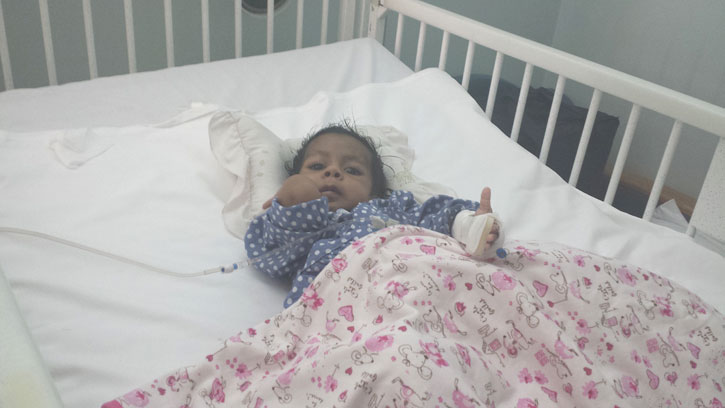Officially opened in November 2012, Hamad Medical Corporation’s Complex Chronic Care Clinic, led by Dr. Ahmed Al Hammadi and Dr. Reem Babiker, has become successful in the management of children suffering from complex, chronic conditions in Qatar. The Complex Chronic Care Clinic’s objective is simple; to provide consistent, constant, child focused and family-centered care for patients who are technology dependent and suffer from multiple medically-complex conditions.
‘Children First’ decided to find out from patients and family members their views of the Clinic at HMC.
We first met Walied and his elder sister, Mariam, who were happy to speak to us about Walied’s diagnosis and the treatment they receive from the Complex Care Clinic. 11 year old Walied was diagnosed with Cerebral Palsy and Lennox Gastaut Syndrome when he was less than a year old. Cerebral Palsy has paralyzed Walied, particularly in his lower body and he is also unable to talk. Along with this, Lennox Gastaut syndrome impacts greatly on his neurological state. Walied is classed as a complex and chronic patient in need of continuous, round-the-clock care from his family members and from healthcare professionals.
Mariam said before the opening of the Complex Care Clinic, life was extremely difficult to manage Walied ‘it was hard for my parents because they had to visit different clinics and hospital departments and see multiple doctors every time they went, such as neurologist and pulmonologist. Now, thanks to the Complex Care Clinic, our experience is completely different. Our appointments are shorter and all based in the one clinic, the doctors that Walied sees are always the same, and so they know Walied well and understand his medical history inside out.’
Complex care nurse Fowzia Elmi explained, ‘We follow up with Walied and his family on a weekly basis via phone calls and offer advice and support. We take care of booking appointments for them and arrange for doctors to come to the clinic, as well as arranging all emergency medical services, such as transport to bring Walied to the clinic.’
We also met 13 month old Aradhya who suffers from Mosaic Trisomy 22, and her mother. Mosaic Trisomy 22 is a disorder in which an extra chromosome 22 is found in some cells of the body. The severity of each case is determined by the number of cells with this extra chromosome. Some characteristics of individuals with this condition are cardiac abnormalities, respiratory problems, growth retardation and mental delay, among others.

Above: Aradhya
Aradhya’s mother described the effects of this disorder on Aradhya which include respiratory problems and constant coughing since birth. Aradhya was in ICU for four months after she was born and she has been operated on three times to date. Before she was operated on, the quality of life for her was poor. She exhibited respiratory congestion and asthma, was nutritionally depleted with limited movement and energy. The family had to cope with anxiety of the urgency of receiving treatment before the condition became irreversible.
Today, with the help and support of the Complex Care Clinic, she has been successfully operated upon and her condition has improved. Now she plays happily and is more energetic, unlike the past year. Her parents are happy to see their daughter play like a normal child. Currently she has a tracheostomy tube and PEG feeding tube to improve her health and condition.
Lastly, ‘Children First’ spoke to a father whose two year old daughter suffers from a rare genetic disorder called Mucolipidosis Type 1 (Sialidosis). She was diagnosed at birth, and as a result suffers from body deformation and has been oxygen dependent ever since. Much like Walied’s parents, the father explained how he and his wife were visiting many different doctors in different locations which was difficult and he felt it was not improving the quality of life for his daughter.
The father explains how family friends, who also have a son with a similar condition, had recommended to them the services of the Complex Care Clinic at HMC. Since visiting the Clinic almost a year ago, he explains, ‘It has been much easier now to visit one clinic only and be referred to the same doctors every time who are aware of my daughter’s health care needs and offer the correct support.’ The clinic has proved a positive for this family as they receive family-centered care and excellent standards of health care from the doctors and nurses they interact with.
The feedback has been extremely positive for all members of the Complex Care Clinic and ‘Children First’ are sure this will continue to grow as the clinic expands its services in the future. We would also like to thank Dr. Reem Babiker and Ms. Fowzia Elmi for their help with the coordination of our clinic visit. Our gratitude also goes to the patients and families for sharing their experiences with us.
